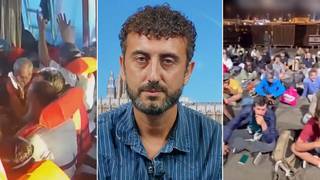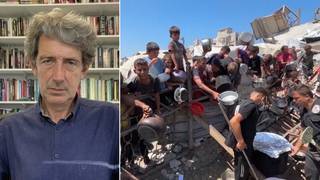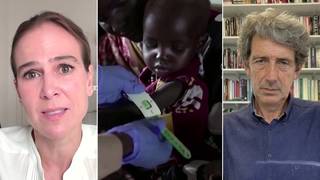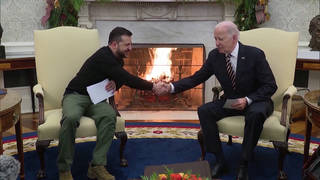
Despite Russian President Vladimir Putin continuing to deny accusations of a planned invasion of Ukraine, the Biden administration ordered the deployment of 3,000 additional troops to Eastern Europe on Wednesday to supposedly protect Ukraine. Moscow-based historian and political writer Ilya Budraitskis says both Russia and the U.S. are gaining more from the threat of conflict than an actual war, and says Russia has no real strategic gain from a potential invasion.
Transcript
AMY GOODMAN: This is Democracy Now!, democracynow.org, The War and Peace Report. I’m Amy Goodman, with Nermeen Shaikh.
The Pentagon says it’s deploying an additional 3,000 troops to Eastern Europe as the Biden administration continues to accuse Russia of planning to invade Ukraine. Pentagon spokesperson John Kirby said U.S. troops would deploy to Germany, as well as Romania and Poland, which border Ukraine.
JOHN KIRBY: The current situation demands that we reinforce the deterrent and defensive posture on NATO’s eastern flank. President Biden has been clear that the United States will respond to the growing threat to Europe’s security and stability.
AMY GOODMAN: On Tuesday, the Russian President Vladimir Putin spoke out about the situation for the first time publicly in a month. He accused the United States of stoking the crisis by ignoring its security concerns about NATO’s expansion eastward.
We now go to Russia, where we’re joined by Ilya Budraitskis, a Moscow-based historian and political writer, the author of Dissidents Among Dissidents: Ideology, Politics and the Left in Post-Soviet Russia. Verso Books has just published the English translation of his book.
We welcome you to Democracy Now!, Ilya. If you can start off by responding to the increased tensions on the border with Ukraine, talk about whether you think Putin has decided to invade yet, and where this all comes from?
ILYA BUDRAITSKIS: Thank you. Thank you for having me here.
So, first, to say that, in fact, if you look back to how this escalation began a couple of months ago, we’ll see that in the beginning there was just some kind of informational fake coming from the Western media, coming from U.S., about the Russian plans to invade Ukraine. And then, somehow, this fake was turned into reality, because Russia was answering to this fake and really put the troops on the border. So, during this two months, we see how the escalation growing from the both sides. And we see how each side use each other to heighten the risks and to gain more from this very dangerous escalation.
NERMEEN SHAIKH: Ilya, given the fact that the situation has escalated to this extent, do you think now Putin is going to invade Ukraine? I mean, Zelensky himself and other Ukrainian government officials, as well as, of course, Russian officials, have said that the threat of an invasion is highly exaggerated and is far from imminent. Your response?
ILYA BUDRAITSKIS: So, I think that if we are talking about the invasion to Ukraine as a kind of a plan of Putin, this plan sounds really strange, because what kind of result of this military solution could be, to change the regime in Ukraine, to provide some long-term military occupation of this country, which is actually a big country with more than 40 million population? So, somehow, this idea that Russia want to invade Ukraine replaced the actual crisis, the actual problem in the east of Ukraine, where we see this dead end of so-called Minsk agreements, which are not really followed, made by Russia and by Ukraine, and which deals with the so-called people’s republics in the east of Ukraine.
But, as I said before, when this kind of fake, this kind of disinformation, about the possible Russian invasion in Ukraine became a real subject of talks and real subject of concerns — and there is, of course, growing military presence of Russian troops on Ukrainian border — this kind of invasion became more and more possible, not in terms of a realization of some exact plan of military occupation of Ukraine, but as the possibility of some kind of provocation or incident on the border between Russian and Ukrainian troops, which could lead to the further military escalation. That’s why it is a really dangerous situation.
NERMEEN SHAIKH: Ilya, could you comment on Russian demands with respect to the eastward expansion of NATO, and also the relevance of NATO, even as almost a dozen Eastern European countries have joined the military alliance since the dissolution of the Soviet Union and the end of the Cold War?
ILYA BUDRAITSKIS: Yes. So, on one hand, you have these demands, which were put forward by Russia in the middle of December last year, where Russia concerned about the growing presence of not just the expansion of NATO, some possible plans to integrate Ukraine and Georgia into NATO and so on. But, on the other side, you have the situation where during this escalation from the both sides, NATO somehow find its idea, find its legitimation, because NATO could exist only in the situation of the confrontation with a real enemy, with some kind of equal force. And, of course, after the collapse of the Soviet Union, after the collapse of the Eastern Bloc, NATO definitely lost this — lost this meaning, lost this idea.
And also, the [inaudible] kind of support of NATO, of the membership of NATO, among the population of the countries, of the members of this military alliance, was — the support was not so much. So the only reason why NATO now somehow get back its idea, its legitimacy, it’s only because Putin’s Russia is ready to play this role of the enemy, of some equal force, which actually Russia is not, if you compare it with NATO. And also, Putin’s, like, worldview, it’s — I will say it’s very comfortable for the explanation why the NATO should expand and should — yeah, should —
AMY GOODMAN: Ilya, what’s —
ILYA BUDRAITSKIS: Yeah.
AMY GOODMAN: What’s the response of the Russian people, number one? And also, the effect of the threatened very high-level sanctions against the inner circle of Putin? And this latest troop deployment, 3,000 troops now, of the U.S. going to the border states?
ILYA BUDRAITSKIS: Yeah, so, we see that now there is the growing and continuing process of heightening the risks from the both sides, because you have this growing of U.S. presence, but also you have the new military trainings on the Ukrainian-Belarusian border, where Russian troops are also taking part. But if we look what’s happening in Russia itself, if there is support for this type of foreign policy, I will say that probably that is not so much. And even if we compare it with what happened in 2014 after the Crimea, after the beginning of Ukrainian crisis, when there was a rise of popularity of Vladimir Putin, there was a rise of anti-Ukrainian chauvinism, kind of imperialist emotions, nationalist emotions, for now, there is nothing like this.
So, during the last years, the Russian economy, the life level of Russians was declining. Also the popularity of Vladimir Putin was going down. And for now, according to the polls, to the opinion polls, the fear of war is one of the main fears of Russians. So, definitely, there is not so much support inside the country for this kind of politics. And that’s why the main line inside the country, if you look to the official propaganda, became much more, let’s say, moderate and peaceful, as it was like two weeks ago, for example. So, for now, the main message is, no, we are not really planning any invasion. We will continue with the talks with the U.S. and so on. And I think that is a kind of response to the real feelings of most of Russians.
NERMEEN SHAIKH: Ilya, very quickly, before we conclude, your book is called Dissidents Among Dissidents: Ideology, Politics and the Left in Post-Soviet Russia. Could you give us a sense of how the major factions of the left in Russia are responding to the situation?
ILYA BUDRAITSKIS: So, in fact, you can divide the Russian left in the two big fractions. So, one is the, let’s say, Communist Party, the biggest party of the position which presented in the parliament, also some Stalinist groups, who were the big supporters of the Kremlin foreign policy, who believe that this policy is justified somehow. But even if you look to the position of these groups, by now, you can say that they’re too much focused on these topics, because any kind of military unity of the society organized from the top immediately marginalized all the agenda focused on the social rights, labor rights and so on that are very much stressed by this type of the left.
But also you have the — you can call the anti-imperialist left, democratic left in Russia, who was always critical to the — what we believe the imperialist politics of Russia. So, we believe that there is not just one imperialism in the world, not just American imperialism, but we are entering the era of clashes, of conflicts, between the different imperialist interests — Chinese imperialism, Russian imperialism and so on. So, that’s why, for us, the main demand in the framework of this growing escalation there, the deescalation from both sides. There are sharp criticism to all their ideas how to divide the world, how to divide Eastern Europe, how to divide the post-Soviet space into some spheres of interests. And we stay for the self-determination, for the democratic rights, for the independent foreign policy for such small countries as the Ukraine, for example, not to be just subjects of these games between different global imperialist powers.
AMY GOODMAN: Ilya Budraitskis, we want to thank you very much for being with us, historian and political writer, speaking to us from Moscow, Russia.












Media Options